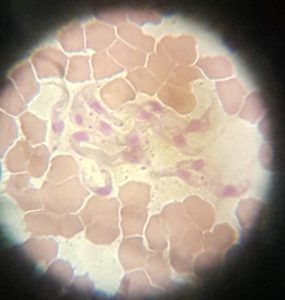Trypanosomiasis in Horses
This is a blood and tissue parasite which also has the ability to invade the nervous system. High levels of parasitaemia are seen in horses, camels and dogs. Although it also affects other animals including livestock (cattle, sheep and goats) buffaloes and pigs. Trypanosomiasis is caused by a protozoan parasite Trypanosoma evansi and T. equiperdum The disease is transmitted by tsetse flies inoculating parasite with its saliva into a horse. Other modes of transmission is sexual and also mechanical transmission by biting insects. Affected domestic animals act as reservoirs for human transmission. However the exact epidemiological role of the animal reservoir in the transmission of the disease is not yet well known.
In horses the disease is characterized by fever, anemia, jaundice, loss of appetite, loss of weight, abortion, lethargy and in coordination. Other signs include edema (Swelling) of the limbs, abdomen, testicles and udder, paralysis of the hind limbs and finally death. The incubation period is 1 to 4 weeks and sometimes up to 8 weeks, after which the symptoms appear. Chronic form of the disease is seen when the horse is losing a lot of weight and neurological signs are as a result of the parasite travelling to the brain, where it causes an inflammatory response leading to encephalitis and cellular necrosis.
Diagnosis is by demonstration of the parasite by blood smear and /or a parasite antigen or host antibody to the parasite is a definitive diagnosis. Though it is not possible to differentiate between T.evansi and T.equiperdum by light or electron microscopy, the later is rarely found in blood or tissues.

Trypanosoma parasite stained with filed stain at The Andys Veterinary Hospital.
Unless treated with trypanocidal drugs like diminazene aceturate, isometamidium chloride, quinapyramine, suramin, or cymelarsan, death is usually imminent. Diminazine aceturate is not effective in the long term treatment. However, l have experienced good results with isometamidium chloride in this part of the world.





